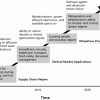Strategic advice to leverage new technologies
Technology is at the heart of nearly every enterprise, enabling new business models and strategies, and serving as the catalyst to industry convergence. Leveraging the right technology can improve business outcomes, providing intelligence and insights that help you make more informed and accurate decisions. From finding patterns in data through data science, to curating relevant insights with data analytics, to the predictive abilities and innumerable applications of AI, to solving challenging business problems with ML, NLP, and knowledge graphs, technology has brought decision-making to a more intelligent level. Keep pace with the technology trends, opportunities, applications, and real-world use cases that will move your organization closer to its transformation and business goals.
Recently Published
I gave a presentation recently to an audience of about 70 people at a large bank. Experience varied between one and 20-plus years, and I would say the average might have been no fewer than 10 years. To demonstrate how low the success rate in projects is, I asked those who had been in at least one project that finished on time and on budget to raise their hands.
Be Ready for Any Disruption
Whether or not you think it has anything to do with global climate change, you have to admit that the weather this winter has been different and dramatic.
Lessons From a Decade of Data: Part III -- Zhou Enlai's Perspective
When Zhou Enlai, China's first communist prime minister, was asked his impression of the French Revolution of 1789, he is purported to have replied: "It's too early to say." His point, of course, was that to properly appreciate momentous events, you need to view them with sufficient historical perspective.
Having been in the computer business for quite a while, I've seen a number of shifts in the underlying architecture of hardware and communications. First, there were mainframes, then minis, then PCs, then local area networks, client-server, and, most recently, the Internet. Now we are faced with a combination hardware/communication/software leap onto "the cloud."
Business Intelligence and Networks of Things and People
The overall mission of operational and business intelligence (BI) is to make sense of and to strategically leverage data and information, much of which can be unstructured. In the near future, thanks to the proliferation of sensor-based information networks, the typical opportunities and challenges linked to knowledge mining will intensify.















